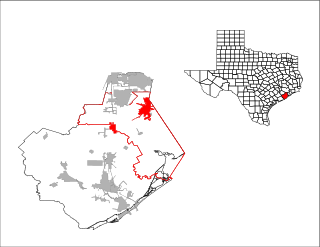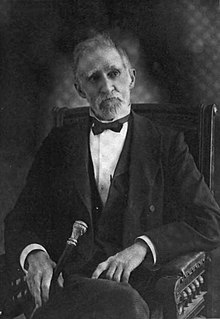Related Research Articles

Brazoria County is a county in the U.S. state of Texas. As of the 2010 census, the population of the county was 313,166. The county seat is Angleton.

Harris County is located in the U.S. state of Texas, located in the southeastern part of the state near Galveston Bay. As of the 2010 census, the population was 4,092,459, making it the most populous county in Texas and the third most populous county in the United States. Its county seat is Houston, the largest city in Texas and fourth largest city in the United States. The county was founded in 1836 and organized in 1837. It is named for John Richardson Harris, who founded the town of Harrisburg on Buffalo Bayou in 1826. According to a July 2018 census estimate, Harris County's population had grown to 4,698,619, comprising over 16% of Texas's population. Harris County is included in the nine-county Houston–The Woodlands–Sugar Land metropolitan statistical area, which is the fifth-most populous metropolitan area in the United States.

Galveston County is a county in the U.S. state of Texas, located along the Gulf Coast adjacent to Galveston Bay. As of the 2010 U.S. Decennial Census, the population was 291,309. The county was founded in 1838. The county seat is the City of Galveston, founded the following year of 1839, located on Galveston Island. The most populous municipality in the county is League City, a suburb of Houston at the northern end of the county, which surpassed Galveston in population during the early 2000s.

Alvin is a city in the U.S. state of Texas within the Houston-The Woodlands-Sugar Land metropolitan area and Brazoria County. As of the 2010 U.S. Census, the city population was 24,236. Alvin's claim to fame is Baseball Hall of Famer Nolan Ryan, who moved with his family to the city in 1947 as an infant and lived there until he moved to Round Rock in 2003. The Nolan Ryan Museum is in the Nolan Ryan Foundation and Exhibit Center on the campus of Alvin Community College.

Nicholas Valentino Lampson is an American politician and a former Democratic Congressman representing the 22nd Congressional District and the 9th Congressional District of Texas.
Kyle Janek, is an American physician and former Republican member of the Texas Senate, having represented District 17 from 2003 until June 2, 2008. The district includes portions of Harris, Brazoria, Fort Bend, Galveston, and Jefferson counties. Janek was not a candidate for renomination to the state Senate in the Republican primary held on March 4.

Texas's 22nd congressional district of the United States House of Representatives covers a largely suburban south-central portion of the Greater Houston metropolitan area. The district includes the majority of Fort Bend County, including most of the cities of Sugar Land, Missouri City, Rosenberg, Needville and the county seat of Richmond as well as the county's share of the largely unincorporated Greater Katy area west of Houston. In addition, the district also contains portions of northern Brazoria County, including Pearland and Alvin, as well as a small portion of southeast Harris County centered on Friendswood.

The United States District Court for the Southern District of Texas is the Federal district court with jurisdiction over the southern part of Texas. The court's headquarters is in Houston, Texas and has six additional offices in the district.

Samuel B. Kent is a former United States District Judge of the United States District Court for the Southern District of Texas, whose term ended in resignation in 2009 following charges of sexual abuse.
The Texas Courts of Appeals are part of the Texas judicial system. In Texas, all cases appealed from district and county courts, criminal and civil, go to one of the fourteen intermediate courts of appeals, with one exception: death penalty cases. The latter are taken directly to the Texas Court of Criminal Appeals, the court of last resort for criminal matters in the State of Texas. The highest court for civil and juvenile matters is the Texas Supreme Court. While the Supreme Court (SCOTX) and the Court of Criminal Appeals (CCA) each have nine members per the Texas Constitution, the sizes of the intermediate courts of appeals are set by statute and vary greatly.

The politics of Oklahoma exists in a framework of a presidential republic modeled after the United States. The governor of Oklahoma is both head of state and head of government, and of a pluriform two-party system. Executive power is exercised by the governor and the government. Legislative power is vested in the governor and the bicameral Oklahoma Legislature. Judicial power is vested in the judiciary of Oklahoma. The political system is laid out in the 1907 Oklahoma Constitution.

Temple Lea Houston was an American attorney and politician who served from 1885 to 1889 in the Texas State Senate. He was the last-born child of Margaret Lea Houston and Sam Houston, the first elected president of the Republic of Texas.

2008 elections for the Texas Legislature were held on Tuesday, November 4, 2008, in the U.S. state of Texas. The Texas Legislature election was conducted concurrently with the election for the 2008 United States presidential race, the United States Senate seat of Republican John Cornyn, and the state's 32 congressional representatives.
Andrew Phelps McCormick was a United States Circuit Judge of the United States Court of Appeals for the Fifth Circuit and of the United States Circuit Courts for the Fifth Circuit and previously was a United States District Judge of the United States District Court for the Northern District of Texas.
Robert Alexander Hefner, born in Hunt County, Texas to William Lafayette Hefner and Sarah Jane Masters Hefner, was a lawyer-turned-politician. He served as mayor of Ardmore, Oklahoma and of Oklahoma City, and as a Justice of the Supreme Court of Oklahoma. He is notable as the originator of the mineral transfer deed known as the Hefner Form, which is still used at present. Hefner was inducted into the Oklahoma Hall of Fame in 1949.
James Patrick Sharp Jr., known as Jim Sharp, is a former justice of the First Texas Court of Appeals, based in Houston, Texas, serving from January 2009 to December 2014.
James Gregory "Greg" Bonnen is a neurosurgeon and a medical professor from Friendswood, Texas, who has been a Republican member of the Texas House of Representatives from District 24 since 2013.

Robert Simonton Gould was a Justice of the Texas Supreme Court from May 1874 to December 1882, serving as Chief Justice from November 1881 to December 1882.
Edward B. Green was appointed by President Benjamin Harrison as the first Chief Justice of the Oklahoma Territory Supreme Court on May 4, 1890. Green, a noted attorney from Illinois, presided over a three-man panel of judges, who were also appointed by President Harrison. The other two judges, known as Associate Justices, were John G. Clark, from Illinois and Abraham J. Seay, from Missouri. Other court officials included Charles H. Filson, as clerk, Warren G. Lurty, as marshal and Horace Speed, as United States Attorney.
Summers T. Hardy was a native of Arkansas who came to Indian Territory in with his family in 1892, settling in what would become Ardmore, Oklahoma. He read law and passed the bar exam in 1897, then entered private law practice in Ardmore and Madill, Oklahoma. Hardy met a young woman from Texas in Ardmore named Laura Scribner, whom he married in 1900. He got into local politics and was elected as a delegate to the Oklahoma Constitutional Convention in 1906. He was named President of the Madill City School board in 1907-1908. He ran for a District 16 judgeship in Marshall County and won, serving 1911-1913, then served briefly in District 29 in 1914.
References
- 1 2 3 4 5 6 7 8 Osterdahl, Andy. "The Strangest Names In American Political History." July 25, 2017. Accessed August 15, 2019.
- Sanders, Justin. "Norton, Anthony Banning." Handbook of Texas Online. June 25, 2010. Modified November 26, 2014. Accessed August 16, 2019.
- ↑ "Funeral of Judge Stillwell Russell." Daily Ardmoreite. May 20, 1914. Accessed April 30, 2018.